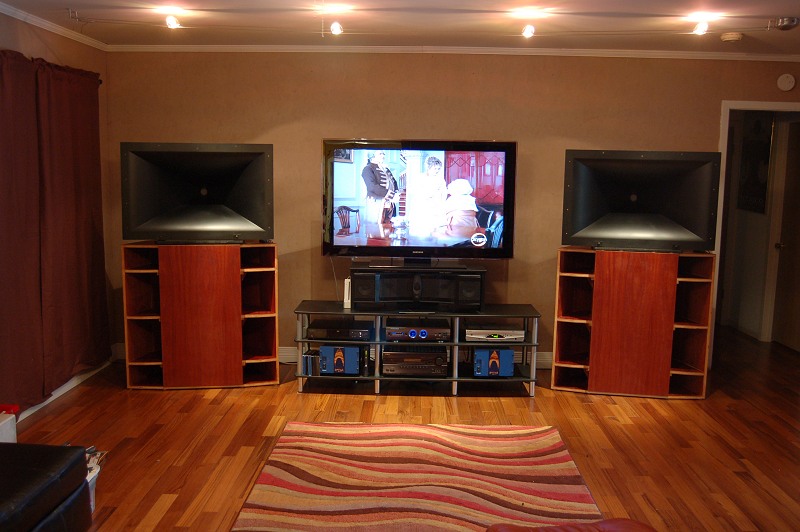-
Posts
2523 -
Joined
-
Last visited
-
Days Won
2
Content Type
Forums
Events
Gallery
Posts posted by Max2
-
-
What happened to the "old" response graphs that Klipsch use to publish. It would be nice to see a graph for the C1 and the C2 just to compare.
Great job on the graph Claude. When Klipsch tests all of their speaker I wonder how they go about the placement in their chamber. Do they actually put a K horn in a sealed corner to check the response? As for all the models with passive radiators, wonder if they place them with proper back spacing form a solid surface or possibly a corner placement. What Im getting at is if they dont load the speakers in their proper location then maybe these response graphs are not telling the whole story. Granted I realize each application especially in each home setup will yield quite different numbers, but I am curious how they keep things constant trying or not trying to keep the reading constant between each model.
-
 Here is one of our pooches.
Here is one of our pooches.Lazy Day

Playful Day

Cranky Day

-
-
Thanks for the lesson Russ. Maybe I should have titled my post as what is the best sounding Receiver that you have heard?
-
Thanks for your response Russ. After looking at a couple of other bench tests from the same site I noticed the new Marantz SR 7005 S/N ratio was just 98 db, Cambridge Azur 650R 106db, Arcam AVR 500, 94db. I realize every brand will have a different sound to it, but dont the S/N numbers have some bearing on noise dynamics and clarity ? It would seem like someone could actually hear a difference between a unit that scored 112db as compared to unit that showed 94db. Maybe someone can shed some light on the whole importance of the S/N ratio.
-
I am going to be buying a new receiver in the next couple of months and have been looking at bench tests done on Onkyo, Pioneer and Denon. Im still juggling the thought of separates using a receiver as a pre amp. The S/N ratio's seem to be dominated by Denon (4310, 3311) coming in a 112db. Pioneer (SC-37A) is showing just over 105 db while the Onkyo is showing 106db. All of the readings are coming from Home Theater. com which would help rule out any differences in testing equipment.
My question is, can someone actually hear the difference in these S/N ratio numbers? Also, would these numbers make a bigger difference when using the Receiver just as a pre out to a main amp? I dont buy new equipment often...my current receiver is 12-13 yrs old. I just want to try and make the best effort on this purchase. Any input is appreciated.
-
Just started setting these up today. Along with a Danley DTS-10 sub horn in the next room (fires into the room from behind the curtain), this home theater should be dynamic to say the least.

Wow. Jub's look great. You need to start a thread on this setup.
-
Thanks for the replys guys. After giving it more thought Im probably going to have to do a wood console piece instead something like Z-line builds. I would like to be able to mount my TV elevated on a rack, but I have a PC hooked up to my TV and it would be visible. Thanks again.
-
I just read your equipment list and it immeddiately hit me that I have seen pictures of your theater posted here. Oh and your location listed helped. Very nice setup you have. Personally, If I had your setup I would keep the XPA-3 as well. Even if you dont use it you still have the meat and potatoes on hand to slap a listener around if needed

-
I have to update my receiver as well in the next few months. I have been back and forth on a Amp/receiver combo or just a receiver too. The Receiver will obviously come first and my thinking in similar to yours as in do I actually need a separate amp? Of course if money was no object it would be any easy decision. I think the differences would be subtle with my bad ears, but having a big amp driving everything definately wins the cool factor. As far as brands go, I have been disapointed looking at bench tests done on big name receivers and seeing how they fall short on the power numbers (some are really short!) when driven with 5 speakers or more. Most of the big receivers keep shedding pounds and the manus keep posting more power which also concerns me. If I was in your shoes I would set the XP-3 aside and see if your ears actually miss it. If they dont I would check actual tests done on the receiver I liked and listen to it before I pulled the trigger. Some of the 120-140 watt a channel receivers can barely pull off 60 -70 watts X 5 channels.
-
The Heresy III and the Cornwall III still use the old style Exponential horn for the mid driver despite using the Ti diaphramed driver. There must be a reason they didnt try and incorporate the Tractix horn for the mids, especially since there would be plenty of room for it with the large Cornwall cabinet.
-
Wow, I was expecting some comments after the graphs were posted. Looking at these bring up a lot of questions IMO. 1. Looking at the Cornwall response it doesnt look to be as sensitive as either Chorus model. 2. The Chorus II seems to be heads and shoulders above the Cornwall II in the bass management which my ears cant confirm. 3. I wonder why Klipsch didnt try and use the updated mid out of the Chorus II when they re-released the Cornwall III ?....maybe they did......
-
Cornwall II vs. Chorus II

-
Frequency response comparison. Now all we need is the Cornwall added.

-
Looking for a integrated system that my 55" will attach to and be elevated. Looking for one that has shelves for a hefty center channel. I have checked out the Bello, Z-line brand and a few others. Anyone know of another brand I should check out? Thanks
-
They are located by looking up the speaker Chorus 1 or II, Forte 1 or II, on the Klipsch website. Then download the owners manual which is available in a PDF format I believe.
What they have listed that I have seen is too small for the Chorus II. The Chorus I is not there.
Well I spoke too soon. Thanks for the link willland
-
What happened to the "old" response graphs that Klipsch use to publish. It would be nice to see a graph for the C1 and the C2 just to compare.
-
I enjoy catching the old tunes on DTV with the various stations, but why is it that some seem to have better signals than others? I know an old recording is just that, but I still hear some of the stations that sound much better than others no matter how old the song or recording is.
-
Very sad to hear. I always enjoyed the Ice Cream for Crow album. I will be breaking it out tonight. Godspeed Captain.
-
Hey Hogfan. Im in Conway and have a set of LaScalas with the AL-3's that you are welcome to come listen to for a comparison. I dont think you should have to swap any driver to get a decent sound out of what you have though. IMO, If I knew I was keeping the LS's I would either upgrade to some AL-3's or rebuild what you have. Since your X-overs are 32+ or- years old you may just have some X-over components out of spec.
-
To those inclined to ask why, does it matter.. Stick around and youll get to know people and not worry about their bussiness
FWIW, I wasn't trying to pry into his personal life; as I said, I'm personally in the boat of just wanting a nice simple system and wonder if he feels the same way. No offense intended.
Geez. I was just curious if he didnt enjoy the Emotiva amp as I have been considering one.
-
Hey Muzzer are you unhappy with your Emo equipment?
-
Personally I think you have the best receiver for the money out there heading your way. Although I am a little biased towards Denon as I have only owned Denon for over two decades now. I have been very intrigued by a few of the other big names out there as I am soon to be in the market for another Reciever or possibly seperates. Denon seemd to always have the cleanest sound among all the receivers I have heard although I have heard just a handful of upper end boutique named receivers. After looking at some bench tests it is shocking to see so many top tier receivers really suck at their actual power output with 5 channels driven. This may not be a big deal to some, but I listen to 5 channel stereo quite a bit and I want to actualy get close to the amount of power I pay for. I would concentrate on features and actual power output and what sound you like. Here are a few tests on some big names and you can see how the numbers are all over the place.
Denon 4310 CI listed at 130 watts per channel
HT Labs Measures
Five channels driven continuously into 8-ohm loads:
0.1% distortion at 113.8 watts
1% distortion at 131.0 wattsSeven channels driven continuously into 8-ohm loads:
0.1% distortion at 104.6 watts
1% distortion at 116.6 wattsOnkyo TX-NR5008 A/V Receiver: listed at 145 watts per channel
 HT Labs Measures
HT Labs Measures HT Labs Measures
Five channels driven continuously into 8-ohm loads:
0.1% distortion at 79.1 watts
1% distortion at 95.5 wattsSeven channels driven continuously into 8-ohm loads:
0.1% distortion at 78.7 watts
1% distortion at 94.6 wattsYamaha RX-Z7 A/V Receiver: 140 watts per channel listed
 HT Labs Measures
HT Labs Measures HT Labs Measures
Five channels driven continuously into 8-ohm loads:
0.1% distortion at 63.0 watts
1% distortion at 66.3 wattsSeven channels driven continuously into 8-ohm loads:
0.1% distortion at 47.1 watts
1% distortion at 54.5 wattsPioneer Elite SC-27 A/V Receiver: listed at 140 watts per channel (Class D amp)
 HT Labs Measures
HT Labs Measures HT Labs Measures
Five channels driven continuously into 8-ohm loads:
0.1% distortion at 111.3 watts
1% distortion at 131.4 wattsSeven channels driven continuously into 8-ohm loads:
0.1% distortion at 107.4 watts
1% distortion at 124.2 watts -
Yep. I have a 10 or 12 year old Denon AVR 3600 that is rated for 90 watts X 5channels. I have been looking for a bench test on it to see how well the Decade + Denon receivers compare to the new stock. Heck I may be just getting 25 or 30 watts to all 5.









Audiovox to purchase the Klipsch group
in 2-Channel Home Audio
Posted
This would be a great time for Klipsch to keep their Heritage line and the "little" shop in Hope and sell the rest of the "Asian" made line. Too bad its not D&M trying to take down Klipsch. No matter who buys them the new owner will surely want to keep the integrity and reputation of Klipsch without shaking things up too much. I really hope management and all the employees are secure.